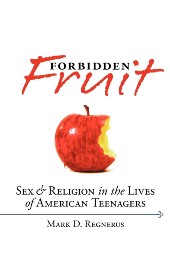Synopsis
Americans remain deeply ambivalent about teenage sexuality. Many presume that such uneasiness is rooted in religion. But how exactly does religion contribute to the formation of teenagers’ sexual values and actions? What difference, if any, does religion make in adolescents’ sexual attitudes and behaviors? Are abstinence pledges effective? What does it mean to be “emotionally ready” for sex? Who expresses regrets about their sexual activity and why?
Tackling these and other questions, Forbidden Fruit tells the definitive story of the sexual values and practices of American teenagers, paying particular attention to how participating in organized religion shapes sexual decision-making. Merging analyses of three national surveys with stories drawn from interviews with over 250 teenagers across America, Mark Regnerus reviews how young people learn – and what they know – about sex from their parents, schools, peers, and other sources. He examines what experiences teens profess to have had, and how they make sense of these experiences in light of their own identities as religious, moral, and responsible persons.






